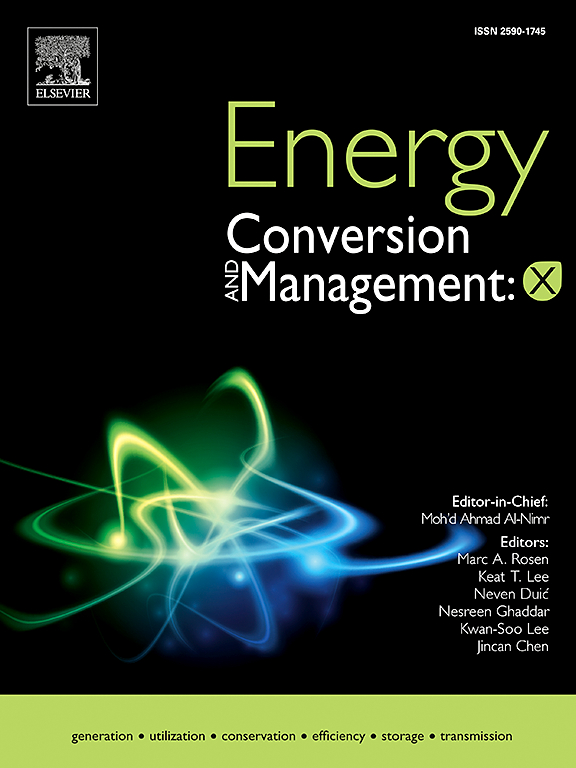基于自适应弯管分解的无碳微电网调度多阶段鲁棒优化模型
IF 7.1
Q1 ENERGY & FUELS
引用次数: 0
摘要
由于发电和需求的不确定性,将可再生能源整合到无碳微电网中会带来运营挑战。传统的鲁棒优化方法依赖于静态不确定性集,往往产生过于保守或不可行的解。本文提出了一种新的两阶段鲁棒优化框架,该框架明确建模决策依赖不确定性(ddu),其中不确定性集动态适应储能调度、电动汽车充电计划和氢燃料电池运行等运营决策。与静态方法不同,此方法捕获系统行为如何影响不确定性界限,从而在保守性和风险之间实现现实的平衡。采用先进的多面体不确定性集动态表示不断变化的不确定性范围,有效地将运营决策与不确定性管理联系起来。为了解决这一复杂问题,开发了一种增强的Benders分解算法,该算法集成了自适应最优性和可行性切割,在动态不确定性调整下仍然有效,确保了计算的可追溯性和全局最优性-这是传统方法(如列约束生成)的局限性。该框架在33总线和69总线并网和孤岛模式下的微电网上进行了验证。结果表明,与静态稳健优化相比,运行成本增加了7 - 12%,但在可靠性方面有了显著提高:孤岛运行期间的负载减少了15 - 20%,电压偏差限制在0.02 p.u.以下,可再生能源利用率提高了5 - 8%。通过动态调整不确定性管理与操作决策,该方法减轻了保守偏差,同时增强了弹性。这项工作为无碳微电网提供了一个实用的决策响应优化工具,推进了解决现实世界不确定性的强大能源管理系统。该框架支持电网运营商平衡运营风险、成本效率和可靠性,为可持续电力系统转型提供了关键途径。本文章由计算机程序翻译,如有差异,请以英文原文为准。
A novel multi-stage robust optimization model for carbon-free microgrid scheduling with decision-dependent uncertainty sets via adaptive benders decomposition
The integration of renewable energy sources into carbon-free microgrids introduces operational challenges due to uncertainties in generation and demand. Traditional robust optimization methods rely on static uncertainty sets, often producing overly conservative or infeasible solutions. This paper presents a novel two-stage robust optimization framework that explicitly models decision-dependent uncertainties (DDUs), where uncertainty sets dynamically adapt to operational decisions such as energy storage dispatch, EV charging schedules, and hydrogen fuel cell operations. Unlike static approaches, this method captures how system actions influence uncertainty bounds, enabling a realistic balance between conservatism and risk. Advanced polyhedral uncertainty sets are employed to dynamically represent evolving uncertainty ranges, effectively linking operational decisions to uncertainty management. To solve this complex problem, an enhanced Benders decomposition algorithm is developed, integrating adaptive optimality and feasibility cuts that remain valid under dynamic uncertainty adjustments, ensuring computational tractability and global optimality—a limitation in traditional methods like Column-and-Constraint Generation. The framework is validated on 33-bus and 69-bus microgrids under grid-connected and islanded modes. Results show a 7–12 % increase in operational costs compared to static robust optimization but demonstrate significant improvements in reliability: 15–20 % reduction in load shedding during islanded operation, voltage deviations constrained below 0.02 p.u., and 5–8 % higher renewable energy utilization. By dynamically aligning uncertainty management with operational decisions, the method mitigates conservative biases while enhancing resilience. This work provides a practical, decision-responsive optimization tool for carbon-free microgrids, advancing robust energy management systems that address real-world uncertainties. The framework supports grid operators in balancing operational risks, cost efficiency, and reliability, offering a critical pathway for sustainable power system transitions.
求助全文
通过发布文献求助,成功后即可免费获取论文全文。
去求助
来源期刊

Energy Conversion and Management-X
Multiple-
CiteScore
8.80
自引率
3.20%
发文量
180
审稿时长
58 days
期刊介绍:
Energy Conversion and Management: X is the open access extension of the reputable journal Energy Conversion and Management, serving as a platform for interdisciplinary research on a wide array of critical energy subjects. The journal is dedicated to publishing original contributions and in-depth technical review articles that present groundbreaking research on topics spanning energy generation, utilization, conversion, storage, transmission, conservation, management, and sustainability.
The scope of Energy Conversion and Management: X encompasses various forms of energy, including mechanical, thermal, nuclear, chemical, electromagnetic, magnetic, and electric energy. It addresses all known energy resources, highlighting both conventional sources like fossil fuels and nuclear power, as well as renewable resources such as solar, biomass, hydro, wind, geothermal, and ocean energy.
 求助内容:
求助内容: 应助结果提醒方式:
应助结果提醒方式:


